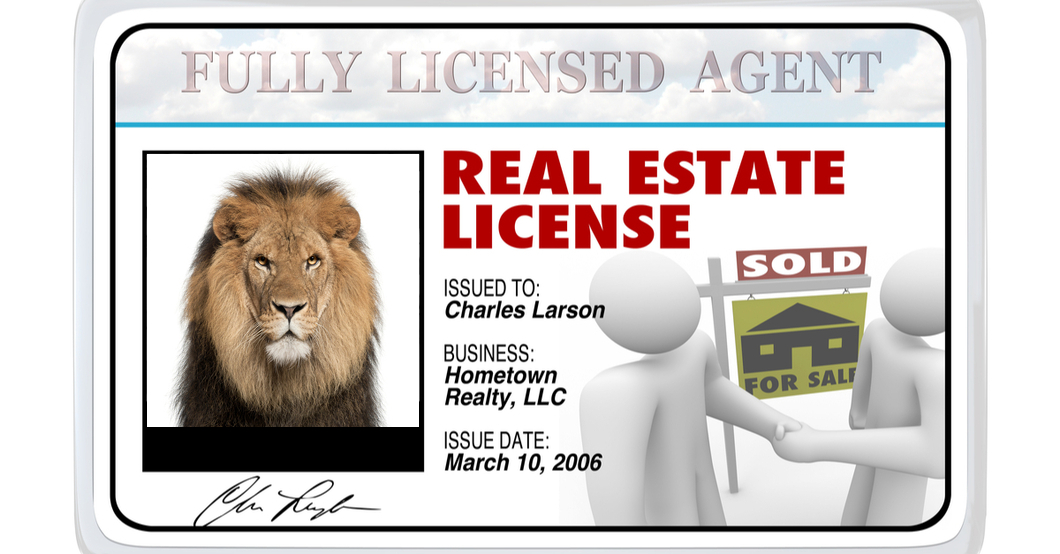
You must meet certain Illinois requirements to become a managing agent. You must be at minimum 20 years old and have a high school diploma, GED or equivalent, as well as at least two years experience in the real-estate industry. You must pass the state exam as well as complete pre-licensing training.
Before you can sit for the state exam, you must complete 45 hours of prelicensing classes. You have the option of a home-study or computer-based program. Or you can opt for a classroom course. All these programs are available through PSI/AMP, which is a private company.
For the managing broker license, applicants must have passed the state exam. They also need at least two years' real estate experience and a valid license from another country. A sponsoring broker must also be licensed. After you receive your license, you must renew it every two years. To do so, you must have completed at least 24 hours of continuing education and pay a renewal fee.

Managing brokers are responsible for approving transactions and overseeing the activities of agents working under them. Most managing brokers don't work directly for their clients. They may meet with clients but their main responsibility is to ensure that they comply with state laws.
Studying online and in a classroom are two options for studying for the Illinois Manage Broker Licensing Exam. Many Illinois real estate schools offer self-paced online courses. These classes will speed up your process for obtaining your license.
After you have completed the pre-license education, and passed the state exam you will need to complete the post-licensing program. You can either take this course at your local college or online. It includes 12 hours of continuing education. A class in Sexual Harassment Prevention Training is required. Additionally, you will need to pass a background screening.
You will need to answer 40 multiple-choice question when you take the managing broker exam. A recommendation will be required. Finally, you will be given a score report from the testing supervisor. Depending on your score, you may need to retake the section of the test that you failed. It is possible to take the exam again three times.

The process of getting a Illinois broker license can be expensive and time-consuming. You could spend up to $700, depending on how you do in your pre-license training and the results from your background check. The average broker makes $103,430. The Greater Chicago area is a top location for real estate brokers to work.
Although you can learn to be a managing broker quickly, it is best to invest in proper training. You can also purchase exam prep materials, which will provide you with useful materials and practice exams. It is important to set up social media accounts as well as your systems.
FAQ
What are the cons of a fixed-rate mortgage
Fixed-rate loans have higher initial fees than adjustable-rate ones. A steep loss could also occur if you sell your home before the term ends due to the difference in the sale price and outstanding balance.
Is it better to buy or rent?
Renting is often cheaper than buying property. It's important to remember that you will need to cover additional costs such as utilities, repairs, maintenance, and insurance. A home purchase has many advantages. For example, you have more control over how your life is run.
Should I buy or rent a condo in the city?
If you plan to stay in your condo for only a short period of time, renting might be a good option. Renting lets you save on maintenance fees as well as other monthly fees. However, purchasing a condo grants you ownership rights to the unit. You are free to make use of the space as you wish.
Statistics
- When it came to buying a home in 2015, experts predicted that mortgage rates would surpass five percent, yet interest rates remained below four percent. (fortunebuilders.com)
- 10 years ago, homeownership was nearly 70%. (fortunebuilders.com)
- Some experts hypothesize that rates will hit five percent by the second half of 2018, but there has been no official confirmation one way or the other. (fortunebuilders.com)
- This seems to be a more popular trend as the U.S. Census Bureau reports the homeownership rate was around 65% last year. (fortunebuilders.com)
- It's possible to get approved for an FHA loan with a credit score as low as 580 and a down payment of 3.5% or a credit score as low as 500 and a 10% down payment.5 Specialty mortgage loans are loans that don't fit into the conventional or FHA loan categories. (investopedia.com)
External Links
How To
How to Manage a Rental Property
Renting your home can be a great way to make extra money, but there's a lot to think about before you start. These tips will help you manage your rental property and show you the things to consider before renting your home.
Here are the basics to help you start thinking about renting out a home.
-
What do I need to consider first? Consider your finances before you decide whether to rent out your house. If you are in debt, such as mortgage or credit card payments, it may be difficult to pay another person to live in your home while on vacation. Your budget should be reviewed - you may not have enough money to cover your monthly expenses like rent, utilities, insurance, and so on. ), it might not be worth it.
-
How much is it to rent my home? The cost of renting your home depends on many factors. These include factors such as location, size, condition, and season. Prices vary depending on where you live so it's important that you don't expect the same rates everywhere. Rightmove shows that the median market price for renting one-bedroom flats in London is approximately PS1,400 per months. This means that if you rent out your entire home, you'd earn around PS2,800 a year. That's not bad, but if you only wanted to let part of your home, you could probably earn significantly less.
-
Is this worth it? You should always take risks when doing something new. But, if it increases your income, why not try it? Before you sign anything, though, make sure you understand exactly what you're getting yourself into. You will need to pay maintenance costs, make repairs, and maintain the home. Renting your house is not just about spending more time with your family. Before you sign up, make sure to thoroughly consider all of these points.
-
What are the benefits? So now that you know how much it costs to rent out your home and you're confident that it's worth it, you'll need to think about the advantages. Renting your home is a great way to get out of the grind and enjoy some peace from your day. It is more relaxing than working every hour of the day. If you plan ahead, rent could be your full-time job.
-
How do you find tenants? Once you've made the decision that you want your property to be rented out, you must advertise it correctly. You can start by listing your property online on websites such as Rightmove and Zoopla. After potential tenants have contacted you, arrange an interview. This will help you evaluate their suitability as well as ensure that they are financially secure enough to live in your home.
-
How can I make sure I'm covered? If you are worried about your home being empty, it is important to make sure you have adequate protection against fire, theft, and damage. In order to protect your home, you will need to either insure it through your landlord or directly with an insured. Your landlord will likely require you to add them on as additional insured. This is to ensure that your property is covered for any damages you cause. However, this doesn't apply if you're living abroad or if your landlord isn't registered with UK insurers. In such cases, you will need to register for an international insurance company.
-
You might feel like you can't afford to spend all day looking for tenants, especially if you work outside the home. You must put your best foot forward when advertising property. Make sure you have a professional looking website. Also, make sure to post your ads online. A complete application form will be required and references must be provided. Some people prefer to do the job themselves. Others prefer to hire agents that can help. Either way, you'll need to be prepared to answer questions during interviews.
-
What should I do once I've found my tenant? If there is a lease, you will need to inform the tenant about any changes such as moving dates. If you don't have a lease, you can negotiate length of stay, deposit, or other details. Remember that even though you will be paid at the end of your tenancy, you still have to pay utilities.
-
How do you collect the rent? When it comes time for you to collect your rent, check to see if the tenant has paid. You will need to remind your tenant of their obligations if they don't pay. Any outstanding rents can be deducted from future rents, before you send them a final bill. If you're struggling to get hold of your tenant, you can always call the police. If there is a breach of contract they won't usually evict the tenant, but they can issue an arrest warrant.
-
What can I do to avoid problems? You can rent your home out for a good income, but you need to ensure that you are safe. Consider installing security cameras and smoke alarms. You should also check that your neighbors' permissions allow you to leave your property unlocked at night and that you have adequate insurance. You should never allow strangers into your home, no matter how they claim to be moving in.